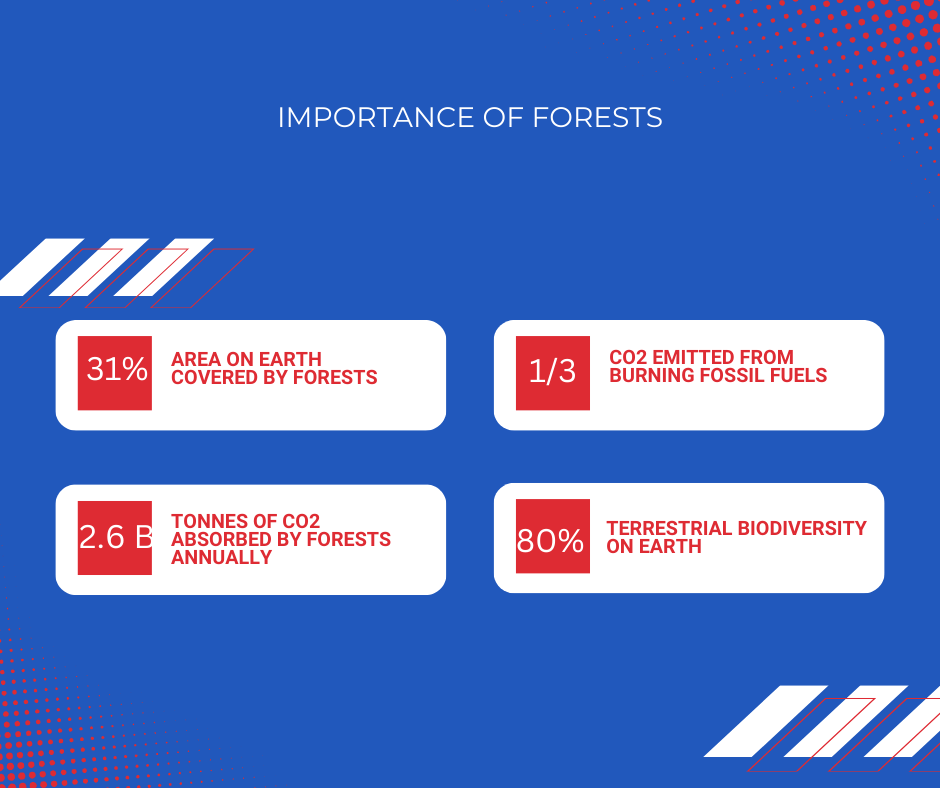Contact: +91 99725 24322 |
Menu
Menu
Quick summary: Discover 5 effective strategies for businesses to combat deforestation and promote sustainability. Explore our blog to learn how companies can make a positive environmental impact.

One of the most important environmental issues of our day is deforestation, which calls for more than just our attention. Businesses all across the world must work together to find a solution. Companies are being urged to take action and contribute to the preservation of these essential ecosystems in light of the disappearing woods and the numerous ecological, social, and economic ramifications.
According to the 2019 IPCC special report on Climate Change and Land, protecting and reforesting existing forests is essential to any strategy aimed at keeping the increase in global average temperature to 1.5°C.
We’ll look at five potent strategies in this blog that companies may use to successfully address the issue of deforestation. The business community is vital to preserving our planet’s forests, from promoting reforestation projects to managing sustainable supply chains. Let’s explore some practical methods that can turn the story of deforestation into one of hope and restoration.

Deforestation poses a critical global challenge by accelerating climate change, destroying biodiversity, and threatening ecosystem stability. It results from activities like logging, agriculture, and urban expansion, leading to soil erosion, reduced carbon sequestration, and habitat loss. To mitigate this crisis, international cooperation, sustainable land management, and reforestation efforts are essential to protect the planet’s ecological balance.
Deforestation is the second largest source of anthropogenic emissions on the planet, second only to the burning of fossil fuels, causing 15% of global greenhouse gas emissions.
Agricultural expansion is the main cause of deforestation, responsible for up to 80% of it in some areas. The mega commodity crops including sugar cane, soy, maize, palm oil, rice, and pasture and feed crops for cattle are the ones most directly linked to deforestation. Illegal logging in particular continues to be a serious concern.
The single largest cause of deforestation and forest degradation globally is agriculture, with large-scale commercial agriculture accounting for 40% of tropical deforestation, and local subsistence agriculture for another 33%.
Businesses play a crucial role in combating deforestation by adopting sustainable practices in their supply chains. They can source materials responsibly, implement certification programs, and support reforestation initiatives. Collaboration with NGOs and governments, transparency in sourcing, and consumer awareness campaigns are key in reducing the environmental and social impacts of deforestation, encouraging a more sustainable and eco-friendly business approach.
Deforestation is a global problem; its reach extends far and wide into many sectors and industries. However, by recognizing this issue and working with suppliers, businesses can ensure that they are promoting sustainable production.
According to analysis by the UN Climate Change High-Level Climate Champions, companies risk failing to deliver on their net zero commitments because they are not doing enough to address deforestation in their supply chains.
To avoid deforestation-linked products, businesses should prioritize responsible sourcing practices. This involves rigorous due diligence, supply chain traceability, and engaging suppliers committed to zero-deforestation policies. Employing certification systems like FSC and RSPO, supporting sustainable agriculture, and investing in alternative materials can help ensure products are free from deforestation impact. Transparency and consumer education also play pivotal roles in making informed, eco-conscious choices.
Certification and labeling programs, such as Fair Trade, Organic, and Energy Star, offer consumers and businesses reliable information about product attributes. They verify quality, sustainability, and adherence to specific standards. These labels empower informed choices, promote ethical and eco-friendly practices, and enhance trust between producers and consumers in the global marketplace.
Supplier engagement and partnerships involve businesses collaborating with their suppliers to foster ethical and sustainable practices. This includes setting environmental and social standards, sharing knowledge, and working together to improve supply chain sustainability. Such efforts enhance transparency, promote responsible sourcing, and contribute to a more ethical and environmentally friendly business ecosystem.
Traceability in supply chains is crucial as it allows for transparency and accountability. It enables the tracking of products from origin to the consumer, ensuring ethical and sustainable practices. This reduces the risk of fraud, promotes responsible sourcing, and helps mitigate environmental and social issues, ultimately enhancing consumer trust and fostering a more sustainable and ethical global marketplace.
Technology-driven traceability solutions, like blockchain and RFID, provide real-time tracking and authentication of products in supply chains. These innovations enhance transparency, reduce fraud, and enable the rapid identification of sources of contamination or ethical concerns. They offer a powerful means to ensure product integrity and sustainability, benefiting consumers and businesses alike.
Traceability is vital in deforestation prevention as it enables the tracking of the origins of products like timber and palm oil. By identifying the sources, it promotes responsible sourcing, deters illegal activities, and helps enforce regulations. Additionally, it empowers consumers to make informed choices and supports businesses in ensuring they are not inadvertently contributing to deforestation, thereby preserving critical ecosystems and combating climate change. Traceability plays a pivotal role in EUDR compliance by ensuring that every step of a pharmaceutical product’s journey is documented and verifiable, ultimately enhancing patient safety and regulatory adherence
Participating in international initiatives and agreements is essential for addressing global challenges, such as climate change. These collaborations foster cooperation among nations, setting common goals, and implementing collective strategies. Agreements like the Paris Agreement and the Sustainable Development Goals provide a framework for tackling pressing issues, enabling countries to share responsibilities, knowledge, and resources in a concerted effort to create a more sustainable and equitable world. Establishing internal deforestation-free policies within a company involves adopting strict sourcing guidelines that require suppliers to prove responsible practices. These policies help mitigate environmental and social risks in the supply chain, enhance corporate responsibility, and meet consumer demands for sustainable products, contributing to a greener and more ethical business image.
Monitoring and reporting progress is crucial for accountability and improvement. It involves regular data collection, assessing performance against established goals, and transparently communicating results. This fosters continuous improvement, helps identify areas needing attention, and enhances stakeholder trust by demonstrating a commitment to responsible and sustainable practices in areas such as deforestation prevention.
Supporting reforestation projects is vital for combatting deforestation and its impacts. This involves investing in initiatives that plant trees and restore degraded ecosystems. Reforestation helps sequester carbon, conserve biodiversity, and protect watersheds. Businesses and individuals can contribute by funding tree-planting programs, partnering with NGOs, and participating in tree-planting events, thus playing a key role in revitalizing our planet’s natural landscapes.
Investing in forest conservation is a strategic move to protect vital ecosystems. This involves providing financial support to organizations and initiatives dedicated to preserving forests, safeguarding biodiversity, and combatting deforestation. Such investments yield long-term benefits, mitigating climate change, sustaining critical resources, ensuring a healthier and more sustainable future.
Collaborating with NGOs and local communities is instrumental in addressing deforestation challenges. It entails engaging in partnerships and sharing resources, knowledge, and expertise. These collaborations support sustainable land management, community involvement, and conservation efforts, fostering a more holistic and effective approach to combatting deforestation while respecting local interests and traditions.
Educating consumers on sustainable choices is pivotal in the fight against deforestation. This entails raising awareness about the environmental and social impacts of their purchases. Businesses can provide clear information on product labels, promote eco-friendly alternatives, and run educational campaigns. Empowering consumers to make informed, environmentally conscious decisions encourages the demand for deforestation-free products, fostering a more sustainable market.
Promoting deforestation-free products is essential to combat the global challenge of deforestation. Businesses can do this by certifying their products, emphasizing sustainable sourcing, and using eco-friendly packaging. Marketing campaigns and labels can highlight their commitment to responsible practices, informing consumers of the environmental benefits. This approach encourages the demand for deforestation-free goods, contributing to the protection of vital ecosystems and biodiversity.
Consumer choices wield significant influence on deforestation. Preferences for products like palm oil, beef, or wood drive demand for these commodities, often leading to unsustainable practices and forest clearance. By opting for certified and sustainable goods, consumers can reduce their contribution to deforestation, incentivizing businesses to adopt eco-friendly sourcing and fostering a more responsible and environmentally conscious market.
Tracex Traceability Solutions are making significant strides in addressing deforestation challenges by providing businesses with the tools and data they need to ensure responsible sourcing and supply chain management. By offering comprehensive traceability solutions, Tracex aids businesses in the following ways:
Visibility into Supply Chains: Tracex enables businesses to trace their products back to the source, helping them identify any suppliers contributing to deforestation. This transparency is crucial in understanding the environmental impact of the supply chain.
Verification of Sustainable Practices: Tracex assists in verifying that suppliers adhere to sustainable and ethical practices. It ensures that businesses can confirm the origin of their raw materials and monitor the certification of products that meet environmentally friendly standards.
Risk Mitigation: Tracex helps in identifying and mitigating potential risks associated with deforestation, such as regulatory penalties, reputational damage, and supply chain disruptions. By proactively addressing these risks, businesses can safeguard their operations.
Data-Driven Decision-Making: Tracex generates data and analytics that enable businesses to make informed decisions about their supply chains. This data can help identify areas where deforestation risks are highest and prioritize efforts accordingly.
Consumer Trust: As consumers become more environmentally conscious, businesses that can prove their commitment to responsible sourcing gain a competitive edge. Tracex allows companies to communicate their sustainable practices, enhancing consumer trust and brand reputation.
In summary, Tracex Traceability Solutions are a vital resource for businesses seeking to address deforestation challenges. By promoting transparency, sustainability, and responsible sourcing, they empower companies to make a positive impact on the environment while ensuring the long-term viability of their operations.
In conclusion, deforestation remains a critical global challenge with far-reaching environmental, social, and economic implications. The collective efforts of governments, businesses, NGOs, and informed consumers are essential to combat this issue. Implementing responsible sourcing, reforestation, and deforestation-free policies, and raising awareness about the impact of consumer choices are key steps in preserving our planet’s precious forests and mitigating climate change. Addressing deforestation is a shared responsibility that requires ongoing commitment and collaboration for a more sustainable future.
